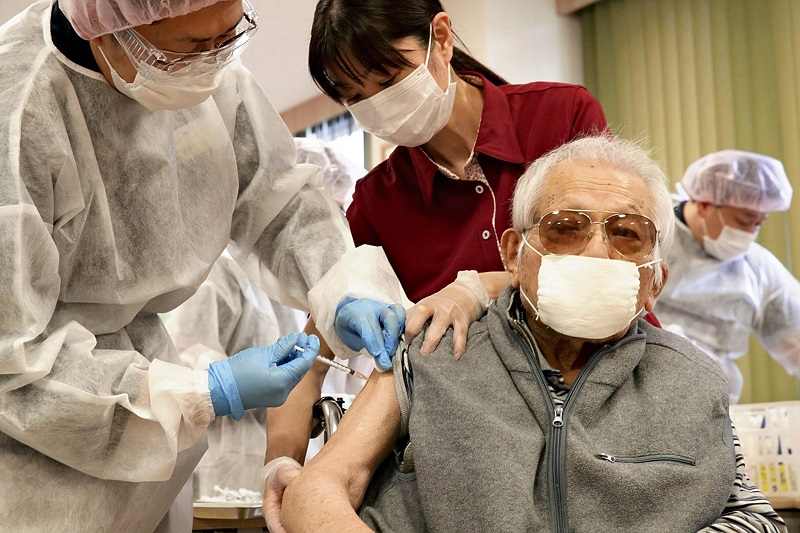
A resident of a special nursing care home receives a coronavirus vaccine Monday afternoon in Setagaya Ward, Tokyo.
16:50 JST, April 14, 2021
TOKYO/SAPPORO — Vaccination is said to be the “silver bullet” against the new coronavirus. But while vaccinations for elderly people began in Japan on Monday, the initial supply of the vaccines is limited even in the face of growing concern over the spread of the virus. Speedy and effective vaccination programs need to be established.

‘Didn’t hurt’
In Tokyo, coronavirus vaccinations began on Monday in two municipalities: Setagaya Ward, with the highest elderly population among all Tokyo wards, and Hachioji, with the highest elderly population among all Tokyo cities.
At a special nursing-care home called Elisabeth Seijo in Setagaya Ward, Tokyo, about 100 residents and staff were vaccinated. No person got sick just after being vaccinated, and relieved-looking residents made such comments as, “It didn’t hurt.”
In Hachioji, 248 people who booked vaccination appointments on a first-come first-served basis received the shots. Some people who could not make the appointments visited the Hachioji municipal government building where the vaccines were administered. The city accepted vaccination appointments on April 5 online or by phone but the vaccination slots were fully booked in only about 90 minutes. The city has been deluged with criticism and complaints. Hachioji Mayor Takayuki Ishimori said, “We would like to increase the vaccination capacity by May 2, when we will next accept vaccination appointments.”
Facilities for the elderly
In many municipalities, the vaccinations begin with residents of facilities for the elderly. On Monday, the Okayama municipal government began vaccinations at an elderly facility partnering with a large-scale hospital capable of treating people who suffer adverse effects from the vaccines or develop other problems.
On the same day, the vaccines were administered to 30 people at an elderly facility in Toyama City, including the staff. A public health center official in charge of the vaccination program said, “Filling the syringe with the medicine took more time than we expected, but I think this issue could be resolved as we get accustomed to the operations.”
In Matsue, 43 people at one facility were vaccinated. A Matsue municipal government official said: “The operations went smoothly. However, since at least one official needs to attend each vaccine recipient, we need to secure a large number of staff.”
Meanwhile, the Wakayama municipal government distributed the vaccines to about 120 medical institutions in the city, including clinics that handle flu vaccines, and had them administer the shots. “People will feel more secure if they are vaccinated by their own family doctor,” a city official in charge of the vaccination program said.
Some municipalities that have yet to start the vaccinations have difficulty securing doctors. Rausu, Hokkaido, has only one full-time doctor. While there are about 1,500 people eligible for the vaccinations, if the sole doctor focuses on the vaccinations, it would affect ordinary treatment. For that reason, the town of Rausu is asking for help from a doctor at a clinic in Nakashibetsu, a town more than 50 kilometers away, and another doctor who is dispatched by a hospital in Sapporo once a week.
In a survey conducted on all 815 of the nation’s municipalities by the Japan Association of City Mayors, to which 640 cities and wards responded, 55% cited “securing doctors, nurses and other healthcare workers” as one of the challenges they face. Multiple answers were allowed for the question.
Limited supply of vaccines
The National Institute of Infectious Diseases expects that new variants of the coronavirus — which are said to be more infectious and are now prevalent in Osaka — will spread in the Tokyo metropolitan area in early May. If a fourth wave of the pandemic leads to an increase in the number of people infected with the virus, healthcare workers will be busy treating patients, which could affect vaccination programs.
The U.S.-based drug maker Pfizer’s COVID-19 vaccine requires two doses given three weeks apart in principle. Japan plans to make sure recipients get the two doses.
Britain says a single dose has proved to be effective to a certain extent and it has stretched the interval between the first and second doses to 12 weeks so that more people are able to receive the first dose. At the moment, about 47% of the British population has received the first dose and hospitalization and death rates from COVID-19 have fallen by more than 75%.
Kiyosu Taniguchi, president of the National Mie Hospital, said, “As the supply of the vaccines is limited, we should discuss ways to benefit society as a whole. Allowing many people to get the first dose of the vaccination is an option, such as giving priority to elderly people in areas where the medical system is under pressure.”
Top Articles in Society
-

Man Infected with Measles Reportedly Dined at Restaurant in Tokyo Station
-

Man Infected with Measles May Have Come in Contact with Many People in Tokyo, Went to Store, Restaurant Around When Symptoms Emerged
-

Woman with Measles Visited Hospital in Tokyo Multiple Times Before Being Diagnosed with Disease
-

Australian Woman Dies After Mishap on Ski Lift in Nagano Prefecture
-

Foreign Snowboarder in Serious Condition After Hanging in Midair from Chairlift in Nagano Prefecture
JN ACCESS RANKING
-

Japan PM Takaichi’s Cabinet Resigns en Masse
-

Japan Institute to Use Domestic Commercial Optical Lattice Clock to Set Japan Standard Time
-

Israeli Ambassador to Japan Speaks about Japan’s Role in the Reconstruction of Gaza
-

Man Infected with Measles Reportedly Dined at Restaurant in Tokyo Station
-

Videos Plagiarized, Reposted with False Subtitles Claiming ‘Ryukyu Belongs to China’; Anti-China False Information Also Posted in Japan























